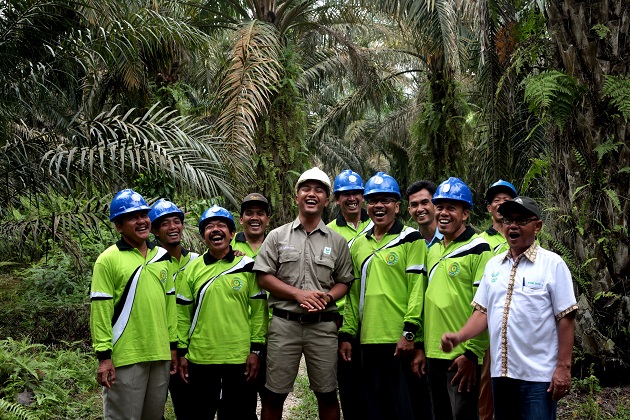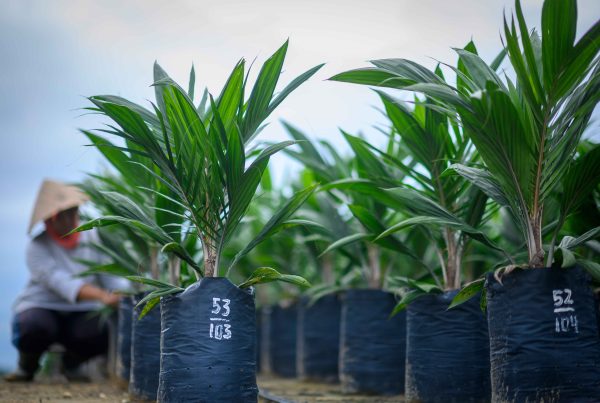A project by WWF and Asian Agri to certify smallholders as sustainable palm oil producers for the first time has been studied in a research paper by Princeton University.
Whatever you’re eating right now, there may be two to three grams of palm oil on your plate.
Palm oil has become one of the essentials in our everyday lives. Palm oil is ubiquitous, found in everything from instant noodles to detergents. In fact WWF estimates that it’s contained in around half of all the packaged goods sold in supermarkets.
How to support this vital crop – and the local communities that depend on it – while mitigating its effect on the environment? That is the subject of a paper by Blair Cameron for Princeton University, which examines a pilot project to help 349 palm oil farmers reduce their environmental impact in Riau, Indonesia.
The project, which was coordinated by WWF and Asian Agri, introduced the farmers to the Roundtable on Sustainable Palm Oil (RSPO), a global organization of palm companies, retailers, financial institutions, and environmental groups. In 2013, the pilot group became the first independent small-scale farmers in Indonesia to get certified under RSPO standards.

Involving smallholders
RSPO was founded in 2004, and its standards were quickly adopted by major producers. But around 40 per cent of palm oil production is by smallholders – 1.7 million of them. Complex supply chains, remote locations and disputes over land ownership makes extending certification to these farmers far more challenging.
In addition, many smallholders lacked the systems and skills needed to achieve certification. For example, farmers must have documented business plans, keep records of their activities and use proper safety procedures for handling chemicals. This requires someone to provide training, farmers to give up time that could be spent on their plantation, and financial investment that is beyond the means of most smallholders.
There are real benefits though. Independent smallholdings are significantly less productive than those that follow farming best practices: a 2013 study by the International Finance Corporation found yields on smallholdings could be half those on better-managed plantations. Spreading RSPO certification would benefit not just the environment, but the smallholders too.
In 2010 a change to RSPO’s rules enabled smallholders to get together and apply for group certification, pooling costs and achieving economies of scale. This provided the opportunity for the WWF pilot project that is the subject of Princeton’s paper
The pilot project
WWF decided to implement the pilot in the area around Tesso Nilo National Park in Riau province, and Asian Agri proved the ideal partner. The company’s own plantations – which account for around half of production – were already RSPO certified, as were its ‘scheme smallholders’: individual farmers who were contracted by the company and made up another 25 per cent of production. The remaining quarter was more difficult.
“There can be a reluctance to form groups,” the report quoted Asian Agri Sustainability Director Freddy Widjaya as saying. “You need to nurture leadership, and finding a leader among smallholders is a challenge.”
WWF was able to find one such leader, the head of a cooperative of 30 smallholders, who agreed to take part in the pilot. Additional recruitment eventually brought the total number of participants in the pilot to 349, responsible for 763 hectares.
Participating farmers received instruction in agricultural techniques, sustainability and business processes.
Measuring success
The project proved such a success that more farmers signed up: by 2016 501 smallholders collectively owning 1,048 hectares were onboard, according to the report.
Production increased significantly, from 14 to 15 metric tons of palm fruit per hectare each year before the association became RSPO certified in mid 2013, to 24 tons yearly in 2015.
The pilot project achieved its goal of getting the first smallholder group in Indonesia certified, though much work remains to be done to reach out to other farmers.
Although RSPO certification is not without its critics – including from some NGOs who argue that palm oil use should be phased out altogether – the report points out that alternative vegetable oils require several times more land to produce the same volume, further impacting the world’s forests.
Currently 84 per cent of Asian Agri’s plantations are RSPO certified.



